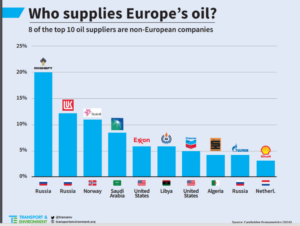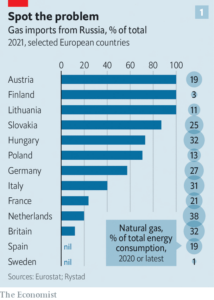
 In addition, the report noted that several European countries also import vast amounts of Russian natural gas; Finland, Austria and Lithuania, for example, import 100 percent of their natural gas from Russia.
In addition, the report noted that several European countries also import vast amounts of Russian natural gas; Finland, Austria and Lithuania, for example, import 100 percent of their natural gas from Russia.
 That said, the report notes that there are some commodities supplied by Moscow that many people have not considered, such as coal in particular. Russia exports nearly as much thermal coal as Australia, while also exporting nearly as much coking coal as the U.S. and about 40 percent of what Australia exports. Cutting off Russian energy supplies, then, is going to put a massive dent in the global supply, which in turn will drive massive inflation.
In addition, the report points out, Russia supplies 50 percent of the world's enriched uranium, which is used in nuclear power plants. While the left-wing greenies in the U.S. hate zero-emission nuclear power for some reason, those plants supply fully one-fifth of our country's daily electricity needs.
Coal is another commodity that powers the U.S. grid, though it is giving way to clean-burning natural gas. And while the U.S. has the resources to make up the difference in all of these categories, much of Europe does not. And not all of our political leaders are 'on board' with restarting President Donald Trump's energy policies, though they led the U.S. to become energy independent for the first time in decades.
"Should the rest of the world be sanctioning Russia’s commodity exports, we’d likely see Weimar Republic style inflation in those countries, particularly Europe," the report concludes.
Already, prices for food and other commodities are spiking globally, as the war in Ukraine enters its fifth week. In the U.S. in particular, gas prices -- which had been rising the entire one-plus year that Joe Biden has been in office -- spiked following Russia's invasion and are now as high or higher in some places as they were during the spike of 2008.
And as the price of gasoline and diesel fuel rises, so, too, does the cost of getting goods to market. Haulers will not simply eat the additional fuel costs; those are going to be passed on to consumers and will only add to an existing cycle of record-high inflation.
The war in Ukraine may be 'over there' for Americans and much of the rest of the world, but because Russia supplies so much of what the world needs to function, the longer the war and sanctions continue, the worse inflation will get.
Sources include:
InternationalMan.com
NaturalNews.com
That said, the report notes that there are some commodities supplied by Moscow that many people have not considered, such as coal in particular. Russia exports nearly as much thermal coal as Australia, while also exporting nearly as much coking coal as the U.S. and about 40 percent of what Australia exports. Cutting off Russian energy supplies, then, is going to put a massive dent in the global supply, which in turn will drive massive inflation.
In addition, the report points out, Russia supplies 50 percent of the world's enriched uranium, which is used in nuclear power plants. While the left-wing greenies in the U.S. hate zero-emission nuclear power for some reason, those plants supply fully one-fifth of our country's daily electricity needs.
Coal is another commodity that powers the U.S. grid, though it is giving way to clean-burning natural gas. And while the U.S. has the resources to make up the difference in all of these categories, much of Europe does not. And not all of our political leaders are 'on board' with restarting President Donald Trump's energy policies, though they led the U.S. to become energy independent for the first time in decades.
"Should the rest of the world be sanctioning Russia’s commodity exports, we’d likely see Weimar Republic style inflation in those countries, particularly Europe," the report concludes.
Already, prices for food and other commodities are spiking globally, as the war in Ukraine enters its fifth week. In the U.S. in particular, gas prices -- which had been rising the entire one-plus year that Joe Biden has been in office -- spiked following Russia's invasion and are now as high or higher in some places as they were during the spike of 2008.
And as the price of gasoline and diesel fuel rises, so, too, does the cost of getting goods to market. Haulers will not simply eat the additional fuel costs; those are going to be passed on to consumers and will only add to an existing cycle of record-high inflation.
The war in Ukraine may be 'over there' for Americans and much of the rest of the world, but because Russia supplies so much of what the world needs to function, the longer the war and sanctions continue, the worse inflation will get.
Sources include:
InternationalMan.com
NaturalNews.com
Are the US-funded Ukrainian biolabs linked to COVID-19?
By Ethan Huff // Share
NATO-allied countries exposed for running biological weapons programs in Ukraine
By Ethan Huff // Share
NBC News: US is deliberately releasing phony intel as part of “info war” against Russia
By Kevin Hughes // Share
By Arsenio Toledo // Share
Global food prices surge to record highs; FAO warns of possible famine all over the world
By Arsenio Toledo // Share
The Coming Food Riots in America: Cycles, Collapse, and the Creeping Police State
By healthranger // Share
The Great Digital Exodus: Why UpScrolled is Becoming the Last Refuge for Uncensored Truth
By healthranger // Share
The afternoon reset: How a short nap reboots your brain for learning
By willowt // Share
Echoes of the Unseen: Independent journalism as the last bastion of truth
By ramontomeydw // Share











